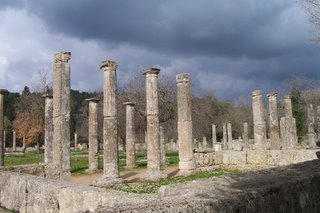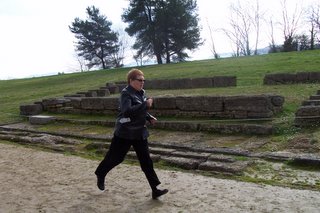My view of the Olympics - Gold for the old

SURVIVAL ISSUES:
WAR ON TERROR. POLARIZATION
 Let me tell you how I got to run in the authentic Olympics this year. My personal international Olympics in the original stadium. My big fat Greek event – gold for the old.
Let me tell you how I got to run in the authentic Olympics this year. My personal international Olympics in the original stadium. My big fat Greek event – gold for the old.In high school I dreamed of being an Olympian. My passion was speed skating, fencing, and sailing. My mediocre performance was shaped by lack of discipline. A mentor opined that I was lousy. Over the decades, guilt has mixed with regret.
Thanks to the world of instant broadcasting, I have been able to get in touch with my inner Olympian every four years by sitting in front of the TV. But even after attending the summer games in both Seoul and Los Angeles, I couldn’t shake my feeble feelings of inadequacy. I knew it was too late to take on those trim twenty year olds. They don’t make spandex in my size.
I thought I could snap out of my torpor when I heard the inspiring words of citizen astronaut Dennis Tito in the spring of 2001. He said he always wanted to into space. So he went, after enduring 900 hours of cosmonaut training at age 60. “It’s never too late to fulfill a dream,” he exulted when he returned from space. “Hope boldly, think huge, and pursue your passion.” I had been following his feat, supporting him in a way one supports athletes, by mind meld. So, his message for me seemed to be: Never too late! Hope! Pursue!
So why should I not run in the authentic Olympic arena?
Though I can’t compete in Torino, I could try to feel an equivalent moment of epiphany at Olympia, Greece, the site of the first games in 776 BC. Would I experience a spiritual moment if I were carried across the centuries to the place where it all began? Maybe my neurosis could be alleviated by a run in the ancient stadium. Why not!
After all, I’d finished a 10K run in less than 60 minutes two years ago. I could answer Tito’s challenge and honor the first women athletes who were only permitted to enter running competitions. I could bring my iPod and play the theme from “Rocky.”
Albeit racing alone, I hoped running in the historic stadium would consummate my athletic destiny. It would give me strength to call up closure to my lost athleticism. And I couldn’t loose, couldn’t disgrace myself. All I had to do was finish! Clearly destiny was at work.
During this time of international strife, Olympia seems a fitting place to recall the purpose of the ancient games. Eighth century AD Greece was weary from internal political strife and deadly plagues. Legend says the god of Delphi proposed the games for deliverance from such evils. Perhaps, likewise, if only for 17 days the athletes in Torino could help us transcend our political polarization and geopolitical angst.
How could my lone run replicate the camaraderie 2,600 athletes from 80 countries are experiencing this week in Torino? True, I’d be running alone in the ancient stadium, so I decided to have my international experience by way of the journey. I’d get to the games the same way the ancient Olympiads did – by ship.
In Genoa, I boarded an Italian cruise ship, the Costa Fortuna, for eastern Mediterranean meals, Italian & Greek language lessons, and running the treadmill in her state of the art equipped gymnasium. I ran faster to the beat of the throbbing 128 beats-per-minute Italian house music. The ships’ crew comes from 60 countries. I’d hear almost the same number of languages on the ship as I would in Torino.
Evenings aboard ship provided a variety of cross-cultural experiences. I danced the Bomxi Bom, the La Bachata, and the Greek Sirtaki. I participated in a trivia quiz on ancient Greece. The visuals reinforced my Mediterranean odyssey. Contemporary Murano glass light fixtures in primary blue and yellow contrasted the warm tones of more than 40 varieties of Italian marble on the ship. It was a retro appeal reworked with modernism – just like the Olympic games. There are large murals by phantasmagorical painter Paolo Grimaldi on the stairs’ landings depicting the ancient navigators. The ancient Olympics were held every four years because of the time required for athletes and spectators to sail to Olympia. I can relate to that as I experience another Mediterranean sunset tonight on the Aegean Sea. This environment was transporting me across time to understand the true spirit of the international competition of the ancient and modern Olympics. And it was a great place to train without distraction. I could run around the deck and become accustomed to the cool temperatures.
My on-board trainer would be a striking young Italian woman from Fecce, in southern Italy. She was muscular, nearly 6 feet tall, with a mop of thick curly dark blonde hair and a striking Roman nose. I soon adjusted to Carolina’s firm Italian commands, “Cambio di gamba! Inspirare! Espirare!” This young woman embraced my dream with fervency. She never discouraged me, despite my advanced age. I sensed she was on her own pilgrimage to Olympia. Carolina studied the ancient Olympics in university. Her eyes revealed a thoughtfulness that we could not share in words. Tomorrow was the day.
Despite overwhelming fatigue following a restless night, I remained awake during the 35 km drive from the port of Katakolon to Olympia. The overcast day did not luminate the silver leaves of the olive trees. I was blessed with cool air and no distracting sun glares. I could run fast in this environment.
I leapt carefully off the last tall step of the bus at the northern end of the ancient grounds of Olympia. I didn’t want a last minute ankle twist to dash my days’ plan. Indeed, I had no medical staff or personal trainer in tow. The first image vitalized me. It was grander than I’d expected and amazingly in tact despite an earthquake in the 6th century AD. I could make out the shape of the ancient buildings by tracing the foundations’ footprints. It was a fun visual game.
The stadium was out of sight, downhill at the south end of the grounds. Very few people were here and the chirp of birds was the dominant sound. Were all the Olympiacs in Turin today?
It wasn’t until after I climbed the steep dark stoned steps of Zeus’ Temple on a center crest that I realized this place was nestled in a hilly landscape at the foot of Mount Kronos, by ancient walls of light stone and shell mortar. Once, Zeus’ temple and his huge gold and marble statue was one of the 7 wonders of the ancient world. Now the tumbled columns with 13-inch flutes lay on the ground. They were carefully felled in a columnar plane. I’d never seen such massive hand-worked stone. The sculpted capitals were the size of a small squared building. The gold statue of Zeus was pillaged by invading Turks centuries ago. From atop the temple I could see the foundation footprint of the gymnasia, barracks, and gathering centers. Peoples came from all corners of the Mediterranean to enjoy music, poetry, and athletic events at this sacred cite centuries ago.
It was from this apex that I caught my first glance of the arch to the stadium. It was time. I descended Zeus’ steps and I imagined myself retracing the steps of athletes, orators, and philosophers on the dirt path to the stadium. I stepped onto a short path of large square stones that led me under an unadorned stone arch. The simplicity of the stadium was in marked contrast to the bordering ornate temples with aligned Doric and Ionic columns. There were no stepped marble benches for the 40,000 spectators. I assumed the observers enjoyed the coolness of the grass as they sat to watch the laboring athletes at the summer games. Without the modern invention of eyeglasses, I wondered if they could see the sweat trickle down the buff bare bodies of the competitors. The slope of the stadium’s hill was perfectly aligned on all 4 sides. The field’s surface was shiny compacted mud, yet it was not slippery. The only two structures were opposing stone edifices on the mid point of the long sides of the rectangular stadium, where ten judges observed from their rock perches close to the racetrack’s edge. Opposite the judges’ row was a taller squared carved stone where the High Priestess Demeter stood as the only woman allowed in the stadium during the games.
I increased my pace until my heart pounded. It was time. I took my mark on the ancient marble starting blocks still firmed into the dirt track at the north end of the stadium. I crouched down. Neither starting gun nor stop watch halted me from bolting forward and streaking boundlessly past the judges stand to the end of the 192-meter track. It was a good run.
I felt the presence of the runners who took the Olympic flame from here to Torino last week, while I caught my breath, hands braced on burning quads. This was better than watching the games on television, or sitting in the stadium. With a sweep of my eyes I tried to imagine the assemblage of 40,000 spectators here 2,700 years ago. I thought of all the unnamed athletes who, like me, ran this stadium. I’ll join them now embellished in myths in future generations. I sensed Carolina saying, “Sei un buon atleta olimpico.”
Clearly I wasn’t running today for myself. Something else was pressing my consciousness. I was running for them – all the athletes who ran here - and those who didn’t have the chance to run in the modern Olympics. They’ve inspired and entertained me. Sure, I have no gold medal, no olive crown, but then again I have no regrets either. I’m at the top of my game. Maybe this euphoria will last two more years until I trek to Beijing. Stay tuned.
WWWD:
Girls and Sports -"Yes We Can," The United Nations Convention on the Rights of the Child.
National Girls and Women in Sports Day
Olympics
It has never been possible to make me believe that defeat is a disgrace.
Louisa Adams, 1828







